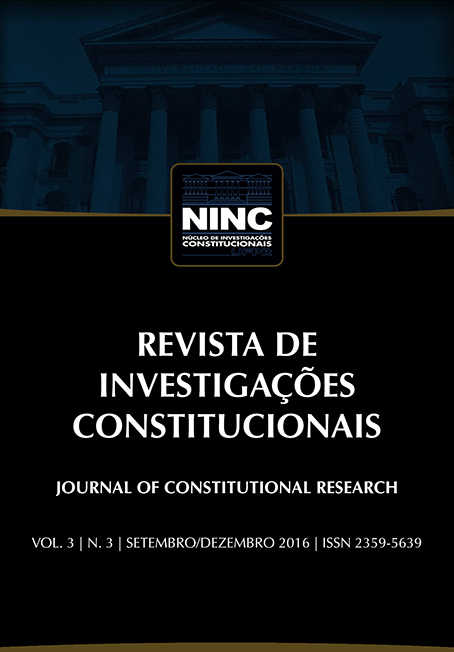Judicialization of the Right to Health and Institutional Changes in Brazil
DOI:
https://doi.org/10.5380/rinc.v3i3.48160Keywords:
Judicialization of healthcare, Brazil, Center for Technical Support in Healthcare Lawsuits, extrajudicial chambers, institucional changesAbstract
The judicialization of the right to health in Brazil may be generating institutional innovations in the system. This judicialization has had unexpected effects, such as disrupting budgetary allocations of public healthcare resources. To deal with such effects, many public authorities directly or indirectly involved with the Brazilian Public Health Care System have created a series of institutional innovations. These innovations aim at i) minimizing the budgetary effects of judicialization and/or ii) decreasing litigation involving the public healthcare system. This chapter highlights two demonstrative cases: the healthcare settlement chambers [Câmaras de Conciliação de Litígios de Saúde] and the centers for technical advisement of judges (Núcleo de AssistênciaTécnica - NAT). This article provides a description of the centers for technical advisement of judges and show the still preliminary attempts to institutionalize extrajudicial forms of settling healthcare litigation.
References
ARGUELHES, Diego Werneck; HARTMANN, Ivar. A. Law in the Books and Books in the Court. Are Social Rights Literature and Judicial Practice on the same page in Brazil? Annuaire International des Droits de L'Homme. v. VII. Athens: Sakkoulas, 2014. p. 15-38.
BAUMGARTNER, F.; JONES, B. Agendas and Instability in American Politics. Chicago: Chicago University Press, 2009.
BRASIL. Política nacional de medicamentos. Brasília: Ministério da Saúde, 2001.
DIERMEIER, D.; KREHBIEL, K. Institutionalism as a Methodology. Journal of Theoretical Politics, London, Thousand Oaks and New Delhi, vol. 15, no 2, p. 123-144, apr. 2003.
FERRAZ, O. The Right to Health in the Courts of Brazil: Worsening Health Inequities? Health and Human Rights Journal, Cambridge, vol. 11, no. 2, dec. 2009.
HOFFMANN, F.; BENTES, F. Accountability and Social and Economic Rights in Brazil. in GAURI, V.; BRINKS, D. (Eds.). Courting Social Justice: Judicial Enforcement of Social and Economic Rights in the Developing World. Cambridge: Cambridge University Press, 2010.
HUBER, E.; STEPHENS, J. Development and Crisis of the Welfare State: parties and policies in global markets. Chicago: University of Chicago Press, 2001.
IMMERGUT, E. Institutional Constraints on Policy. In: MORAN, Michel; REIN, Martin; GOODIN, Robert. E. (Eds.). The Oxford Handbook of Public Policy. Oxford: Oxford University Press, 2006.
KINGDOM, J. Agendas, Alternatives, and Public Policies. London: Addison-Wesley Educational Publisher, 1995.
MAHONEY, J.; THELEN, K. Explaining Institutional Change: ambiguity, agency, and power. Cambridge: Cambridge University Press, 2010.
OLIVEIRA, Vanessa E.; NORONHA, Lincoln. Judiciary-Executive relations in policy making: the case of drug distribution in the state of São Paulo. Brazilian Political Science Review, vol. 5, no. 2, p. 10-38. 2011.
PEPE, Vera Lúcia Edais et al. A judicialização da saúde e os novos desafios da gestão da assistência farmacêutica. Ciência e Saúde Coletiva, Rio de Janeiro, vol. 15, n. 5, p. 2405-2414. 2010.
PIERSON, P. Dismantling the Welfare State?: Reagan, Thatcher and the Politics of Retrenchment. Cambridge: Cambridge University Press, 1995.
PIERSON, P. Politics in Time: history, institutions, and social analysis. New Jersey: Princeton University Press, 2004.
PRADO, Mariana. The Debatable Role of Courts in Brazil's Health Care System: Does Litigation Harm or Help? The Journal of Law, Medicine & Ethics (Special Issue: SYMPOSIUM: Global Health and the Law), Boston, vol. 41, Issue 1, p. 124–137. 2013.
RIBEIRO, Leandro Molhano. Federalismo, Governo Local e Políticas Sociais no Brasil entre 1996 e 2004. In: HOCHMAN, Gilberto; FARIA, Carlos Aurélio Pimenta de (Org.). Federalismo e Políticas Públicas no Brasil. Rio de Janeiro: Editora Fiocruz, 2013.
RIBEIRO, Leandro Molhano; PAULA, Christiane Jalles de. Conselho Nacional de Justiça. Dicionário Histórico Biográfico Brasileiro. In: ABREU, Alzira Alves de et al (Coords.). Dicionário Histórico Biográfico Brasileiro – Pós-1930. Rio de Janeiro: CPDOC, 2010.
SARLET, Ingo W. A Eficácia dos Direitos Fundamentais: uma teoria geral dos direitos fundamentais na perspectiva constitucional. 10ª ed. Porto Alegre: Livraria do Advogado, 2010.
SARLET, Ingo Wolfgang; MOLINARO, Carlos Alberto. Democracia - Separação de Poderes - Eficácia e Efetividade do Direito à Saúde no Judiciário brasileiro - Observatório do Direito à Saúde. Porto Alegre: [s. n.], 2011.
SILVA, José Afonso da. Curso de Direito Constitucional Positivo. São Paulo: Malheiros, 1992.
TATE, C. Neal; VALLINDER, T. The Global Expansion of Judicial Power. New York: New York University Press, 1995.
THELEN, K. How Institutions Evolve: The Political Economy of Skills in Germany, Britain, the United States and Japan. Cambridge: Cambridge University Press, 2004,
TORRES, R. O Mínimo Existencial e os Direitos Fundamentais. Revista de direito da Procuradoria Geral do Estado do Rio de Janeiro. Rio de Janeiro, n. 42, p. 69-78, 1990.
TSEBELIS, G. Veto Players: How Political Institutions Work. New Jersey: Princeton Universtity Press, 2002.
ZAHARIADIS, N. Comparing Three Lenses of Policy Choice. Policy Studies Journal, Washington, vol. 26, issue 3, p. 434-448, sep. 1998.
Downloads
Published
How to Cite
Issue
Section
License
Authors who publish in this Journal agree to the following terms:
- Authors retain copyright and grant the Journal of Constitutional Research the right of first publication with the article simultaneously licensed under the Creative Commons - Attribution 4.0 International which allows sharing the work with recognition of the authors and its initial publication in this Journal.
- Authors are able to take on additional contracts separately, for non-exclusive distribution of the version of the paper published in this Journal (eg.: publishing in institutional repository or as a book), with a recognition of its initial publication in this Journal.
- Authors are allowed and encouraged to publish their work online (eg.: in institutional repositories or on their personal website) at any point before or during the submission process, as it can lead to productive exchanges, as well as increase the impact and the citation of the published work (see the Effect of Open Access).
























